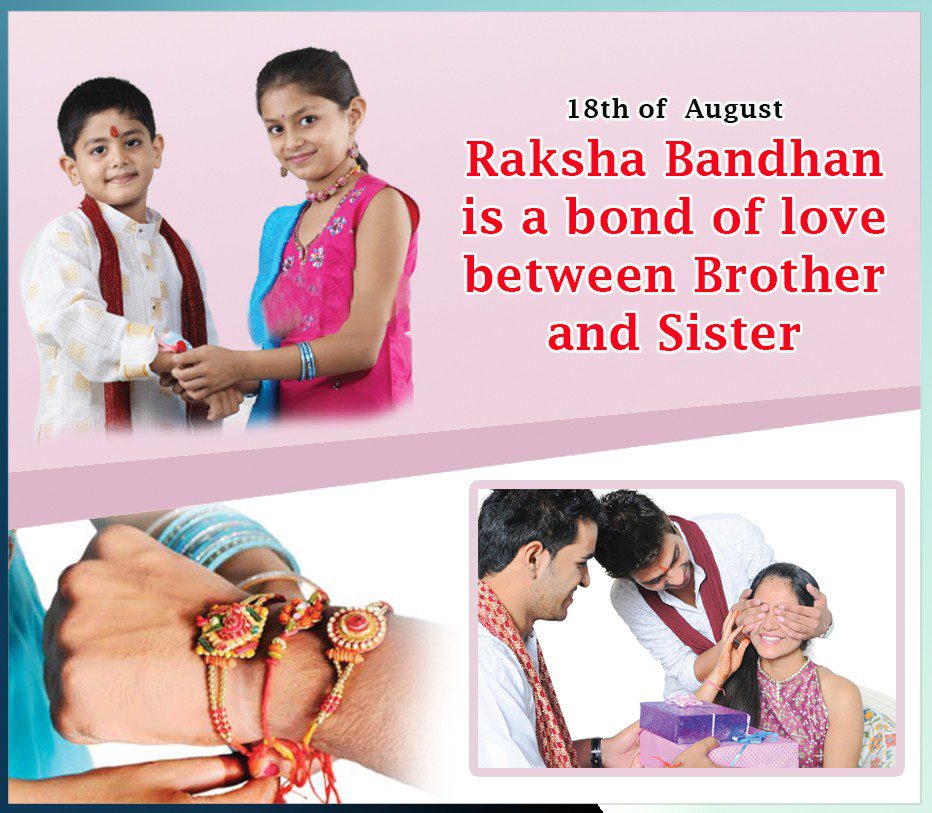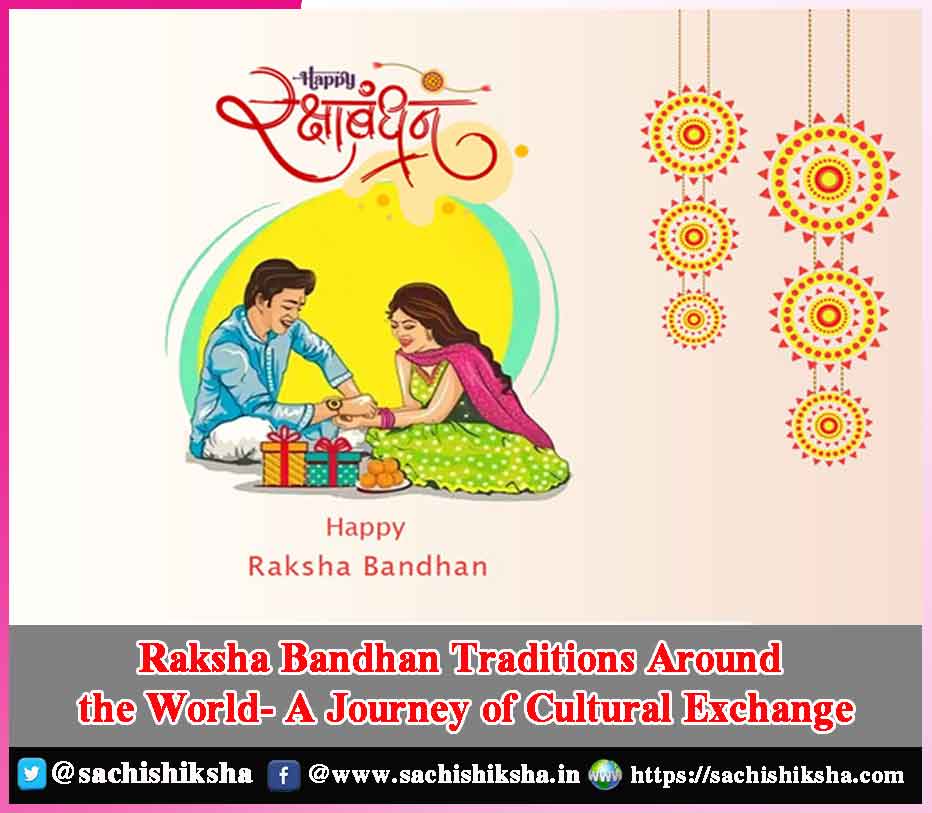Raksha Bandhan Traditions Around the World- A Journey of Cultural Exchange
Also Read:
- Mother is somewhat very special
- Father is like a huge Tree under whose shade we grow FATHER’S DAY : JUNE 19
- Raksha Bandhan is a bond of love between Brother and Sister
Table of Contents
Meaning of Raksha Bandhan:

Tagore’s Vision of Raksha Bandhan:
Rabindranath Tagore, India’s Nobel laureate, wished to capitalize on Raksha Bandhan to foster kindness and solidarity among Hindus and Muslims during the time of division. He perceived it as an emblem of adoration and devotion. He hoped that Hindus and Muslims would band together to oppose British authority and division efforts. Friendship Day, which is now extensively observed, might be seen as an extension of Raksha Bandhan, based on Tagore’s vision.
The Ceremony of Raksha Bandhan:
As part of the ceremony, the sister ties an auspicious thread, which represents sibling love, onto her brother’s wrist. The event begins with traditional Aarti and concludes with well-being blessings (for optimal wellness, good fortune, and contentment). This is the reason why Raksha Bandhan is considered a significant and appreciated Indian festival. During the blessing, the sister applies a Tilak, a colorful mark on the head of the brother. Following that, the brother swears to guide and safeguard her throughout every moment of her life. Additionally, as is typical, a brother welcomes his sister with presents. The offerings are significant as expressions of love and dedication.
The Tale of Krishna and Draupadi:
The tale that is most commonly associated in Indian mythology is that of Lord Krishna and Draupadi, the wife of the five Pandavas. The narrative continues with Makar Sankranti. In the Mahabharata, Draupadi and Krishna are siblings. According to the legend, Krishna sliced his finger while cultivating sugarcane.
Queen Rukmani, Krishna’s wife, instructed somebody to obtain bandages. Draupadi, on the other hand, noticed what had occurred and cut a piece of her saree and wrapped it around Lord Krishna’s finger in order to stop the bleeding from continuing. Krishna then offered to assist her whenever she requested it. A long time later, the Kauravas the cousins of Pandavas publicly attempt to strip Draupadi by unraveling her saree. Krishna is present and notices this. Krishna employs his divine power to make Draupadi’s saree never come to an end thereby saving Draupadi from being dishonoured.
Rani Karnavati & Humayun:
Another rendition of Rakhi’s history involves Rani Karnavati and Emperor Humayun. Karnavati took over as Mewar’s authority after her husband, Rana Sanga, died. Vikramjeet, her eldest son, was her king. Gujarat’s Bahadur Shah invaded Mewar for the second time. He had previously defeated Vikramjeet. The Queen proceeded to seek assistance from other realms. Despite their reservations, the Nobles consented to take on Shah’s challenge. In the meantime, Karnavati appealed to Humayun for assistance. She offered him a Rakhi and asked for his protection. Humayun subsequently gave the territory back to Karnavati son, Vikramjeet.
The Bhavishya Puran Text and the Rakhi:
In the Bhavishya Puran text, Indra’s wife Sachi tied a piece of cloth around his wrist in order to shield him from the mighty evil King Bali. This myth implies that sacred strands were worn as charms in ancient India, by women to safeguard men who went to war, and were not restricted to brother-sister ties.
King Porus & Roxana:
In 326 BCE, Alexander the Emperor conquered India. Roxana, his wife, was concerned regarding his well-being. She sent a Rakhi to King Porus, King of the Pauravas, and pleaded him not to harm her husband on the battle field. King Porus noticed the Rakhi on the wrist amid the conflict of the Hydaspes River. This brought back memories of his pledge to Roxana. He therefore refrained from striking Alexander. Porus lost the battle, but he gained Alexander’s admiration and esteem. Porus was reinstalled as Governor of Alexander’s kingdom. He also gave him authority over the final territory to the southeast of his realm.
Devi Manasa & Lord Ganesh:
Devi Manasa, Ganesh’s sister, paid a visit on Raksha Bandhan. She wrapped a Rakhi around Ganesh’s hand. Lord Ganesh’s sons, Shubh and Labh, were moved by this wonderful custom. However, they were disappointed that they lacked a sister. They requested their father for a sister so that both of them could celebrate Raksha Bandhan. Ganesh finally agrees after much persuasion. Santoshi Maa is born, and the three siblings observe Raksha Bandhan each year following that.
Vishnu, King Bali & Goddess Lakshmi:
When Vishnu overcomes the three worlds from King Bali, King Bali invites Vishnu to reside in his residence, according to the Bhagavad Puran and Vishnu Puran. Vishnu’s wife, Goddess Lakshmi, is not pleased with the present arrangement. She binds a Rakhi around King Bali’s wrist, declaring him a brother. King Bali, moved by the act, gives her a desire. Vishnu is asked to come back home by Lakshmi.
Raksha Bandhan & Punjab:
Raksha Bandhan originated in the northern Indian province of Punjab as a method to symbolize the relationship between distinct groups of individuals. Punjab, as a border state, frequently battled against neighboring armies. As a result, Raksha Bandhan primarily represented the link between the Punjabi soldiers and the citizens of the state it guarded. In Punjab, the holiday evolved into a method to honor the brother-sister bond likewise.
The Relevance of Raksha Bandhan:
Nowadays, the Raksha Bandhan celebration is celebrated all over the world. Because many of us reside in countries other than our own, we can enjoy the Rakhi celebration from anywhere in the world. The distance no longer prevents a brother-sister combo from embracing Raksha Bandhan with identical zeal. The advent of E-Rakhi’s as well as online Rakhi presents has made it easy to enhance the link between siblings regardless of location. Furthermore, conferencing and video calls on Raksha Bandhan enables us to quickly communicate with our distant siblings.












































